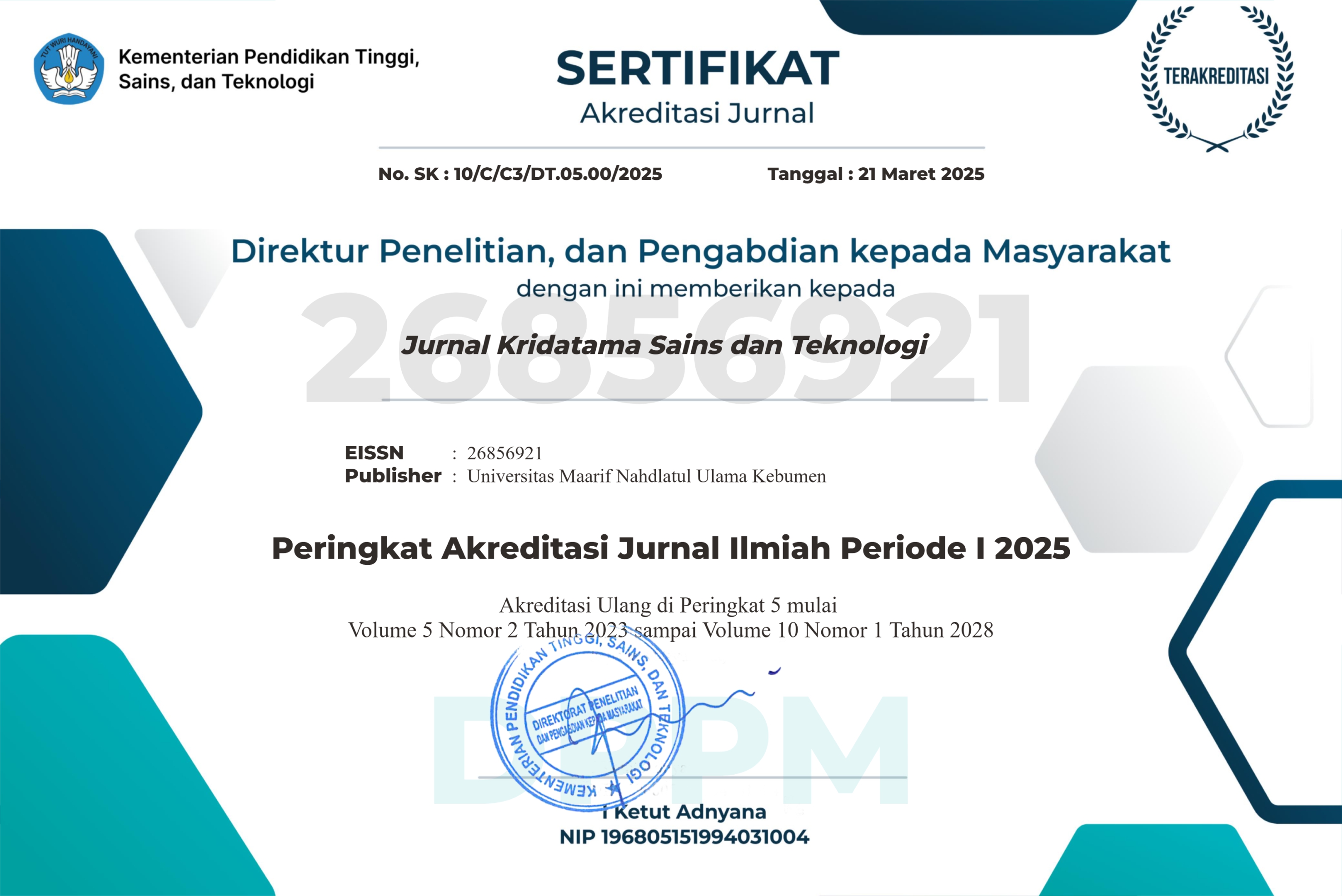Media Digital dalam Pendidikan Anak Usia Dini: Antara Inovasi Pedagogis dan Tantangan Etis
DOI:
https://doi.org/10.53863/kst.v7i02.1773Keywords:
digital media, early childhood education, digital ethics, teachers’ digital literacy, play-based learningAbstract
The development of digital media in early childhood education (ECE) presents both pedagogical opportunities and complex ethical challenges. This study aims to develop and evaluate a digital media model that balances educational innovation with child rights protection, focusing on the integration of teachers' digital literacy and child-friendly application design. A mixed methods approach with a convergent parallel design was employed, involving 12 teachers and 60 students from three ECE institutions in Jember Regency, along with 9 parents. Data were collected through semi-structured interviews, participatory observation, and document analysis, and analyzed using thematic techniques and descriptive statistics with NVivo 14 and SPSS version 26. The findings indicate that digital media usage in ECE remains largely passive and lacks ethical consideration, while teachers and parents express strong needs for educational and safe media. Interventions in the form of ethical digital literacy training modules and a prototype of a play-based digital learning application improved teachers’ ethical awareness and children's active engagement in learning. The products were revised based on field evaluations to align with local contexts and user characteristics. This research contributes conceptually by proposing an ethical digital pedagogy model and provides practical recommendations for policy development, application design, and training for teachers and parents to build a safe, inclusive, and meaningful digital education ecosystem for young children
References
Adams, M., Lopes, R., & Ta, V. T. (2023). Ethical AI frameworks for children. AI, Brain and Child. https://doi.org/10.1007/s44436-025-00003-5
Creswell, J. W., & Plano Clark, V. L. (2021). Designing and conducting mixed methods research (4th ed.). SAGE Publications. https://us.sagepub.com/en-us/nam/designing-and-conducting-mixed-methods-research/book262842
Digital Self Determination. (2025). https://en.wikipedia.org/wiki/Digital_self-determination
Early Childhood Digital Pedagogy. (2024). Early Childhood Education Journal.
Fetters, M. D., Curry, L. A., & Creswell, J. W. (2013). Achieving integration in mixed methods designs—principles and practices. Health Services Research, 48(6pt2), 2134–2156. https://doi.org/10.1111/1475-6773.12117
Fu, X., & Weng, Z. (2024). Data privacy in AI ECE BT - Innovating responsibly. https://doi.org/10.1007/s44436-025-00003-5
Ito, M. (2013). Hanging Out, Messing Around, and Geeking Out. MIT Press.
Laili, N., & Ritonga, R. S. (2022). Urgensi media digital di PAUD. PeTeKa: Jurnal Penelitian Tindakan Kelas Dan Pengembangan Pembelajaran, 6(3), 577–586. https://doi.org/10.31604/ptk.v6i3.577-586
Miles, M. B., Huberman, A. M., & Saldaña, J. (2020). Qualitative data analysis: A methods sourcebook (4th ed.). SAGE Publications. https://us.sagepub.com/en-us/nam/qualitative-data-analysis/book246128
Munir, M. M., Alwan, M. A., Husairi, H., Lisnawati, L., Nita, N. S. H., Hayaturrayan, H., & Sholehah, H. S. (2022). Peningkatan Pemahaman Literasi Anak Dan Remaja Di Desa Sukarema Kecamatan Lenek. EMPOWERMENT: Jurnal Pengabdian Pada Masyarakat, 2(2), 1–11. https://doi.org/10.51700/empowerment.v2i2.381
Mutiarasari, A., & Rachmawati, Y. (2025). Strategi dan Tantangan Keterlibatan Ayah dalam Pengasuhan Anak Usia Dini di Era Digital. January. https://doi.org/10.31004/obsesi.v8i6.6463
Nurchaili, S., & Mulyana, A. (2021). Etika penggunaan media digital pada anak usia dini. Cakrawala Pendidikan, 40(2), 295–308. https://doi.org/10.21831/cp.v40i2.39114
Nurhayati, S., Noor, A. H., Musa, S., Jabar, R., & Abdu, W. J. (2022). A Digital Literacy Workshop Training Model for Child Parenting in a Fourth Industrial Era. HighTech and Innovation Journal, 3(3), 297–305. https://doi.org/10.28991/HIJ-2022-03-03-05
Paradigms, P., Issues, E., & Implications, S. (2025). Artificial Intelligence in Early Childhood STEM Education : A Review of Artificial Intelligence in Early Childhood STEM Education : A Review of Pedagogical Paradigms , Ethical Issues , and Socio-Political Implications. March. https://doi.org/10.55549/jeseh.800
Pawitri, A. (2022). Pemanfaatan media digital aman. Jurnal Kolaboratif Sains.
Polit, D. F., & Beck, C. T. (2021). Nursing research: Generating and assessing evidence for nursing practice (11th ed.). Wolters Kluwer. https://shop.lww.com/Nursing-Research/p/9781975110642
Saldaña, J. (2021). The coding manual for qualitative researchers (4th ed.). SAGE Publications. https://us.sagepub.com/en-us/nam/the-coding-manual-for-qualitative-researchers/book243616
Sitanggang, A., Mairianta, B., Syarefi, F. A., G., G., Duha, Y. C. S., & Rambe, L. A. (2023). Dampak media digital terhadap kemampuan berbahasa Indonesia anak usia dini. Madani: Jurnal Ilmiah Multidisiplin. https://doi.org/10.5281/zenodo.14923530
Sugianto, S. (2022). Tantangan pendidikan karakter di era digital. ASPIRASI.
Waruwu, M., Utami, P. R., & Yanti, E. (2025). Metode Penelitian Kuantitatif: Konsep, Jenis, Tahapan dan Kelebihan. Jurnal Ilmiah Profesi Pendidikan, 10(2), 45–60. https://jipp.unram.ac.id/index.php/jipp/article/view/3057
Yuniarti, P., Wianti, W., & Rini, R. S. (2023). Metode penelitian sosial. Google Books. https://books.google.com/books?id=cW7KEAAAQBAJ
Downloads
Published
How to Cite
Issue
Section
License
Copyright (c) 2025 Irmawati Irmawati, Erick Herdiansyah, Faizal Arimbawan, Endra Priawasana

This work is licensed under a Creative Commons Attribution-ShareAlike 4.0 International License.
Authors retain copyright and grant the journal right of first publication with the work simultaneously licensed under a Creative Commons Attribution-ShareAlike 4.0 International License that allows others to share the work with an acknowledgment of the work’s authorship and initial publication in this journal

















